















Cars of All Colors at Tokyo Show Come in Shades of Green |
|---|
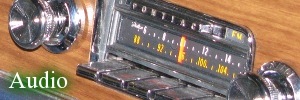
|
Steve Herman
Tokyo, Japan
October 19, 2005
Audio Version 338KB RealPlayer
Three days before the public opening of the Tokyo Motor Show, reporters got an advance peek. The highlight at this year's show will be vehicles that are environmentally friendly.
With hundreds of reporters and photographers on hand, Toyota's President Katsuaki Watanabe unveils the top Japanese automaker's latest concept model - the Fine-X.
It features four-wheel independent drive control for getting into those ultra-tight parking spaces, and a hybrid fuel cell-gasoline powered engine.
While this year's famous Tokyo Motor Show will feature cars of all sizes - many, whatever their paint color, will have a tint of green figuratively. Most Japanese and foreign manufacturers are eager to demonstrate that they are joining the green revolution by making cars that are more fuel efficient or use alternative sources of energy.
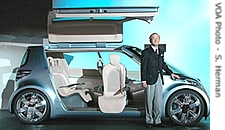 |
Toyota President Katsuaki Watanabe unveils the hybrid Fine-X 48KB |
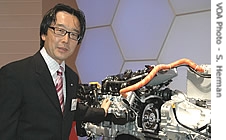 |
Subaru's Jun Imada explains to VOA News about the automaker's hybrid technology 47KB |
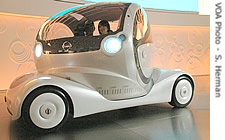 |
Nissan's battery-powered Pivo with rotatable cabin 47KB |
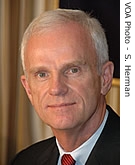 |
Helmut Panke 42KB |
Toyota has led the way with the commercial success of its Prius model - a gasoline-electric hybrid.
With record high oil prices and rising global concern about the effects auto emissions have on the environment, other automakers are jumping on the bandwagon.
Subaru spokesman Jun Imada says the desire to produce environmentally friendlier vehicles is not just about profit, because the development costs are extremely high and there is no guarantee of a payoff in the marketplace.
"As a system, fuel cells have a very difficult engineering wall," he said. "But when we think about the environmental benefit, we automobile companies must finish the work for the new types [of technology], like a fuel cell, to protect nature."
Subaru is unveiling its own gasoline -electric motor hybrid (the B5-TPH). Competitor Mazda is displaying dual-fuel systems partly powered by hydrogen. Honda is rolling out its FCX concept car - a premium fuel-cell sedan. And Nissan unveiled the Pivo concept car, powered by a compact lithium-ion battery, with a driver and passenger cabin that revolves 360 degrees, eliminating the need to shift into reverse.
BMW's Chairman, Helmut Panke remains a skeptic. He says that while such heavier hybrids can be more fuel efficient in stop-and-start urban driving, the fuel cell and electric cars will not spell doom for the gasoline-powered engine.
"Less than five percent of total market will, in the long term, be hybrid," he said. "It will have application for certain uses and everybody will have to have it because customers ask for it, but the bigger challenge is to reduce the fuel consumption for the standard engine."
The German luxury automaker is not ignoring alternative fuels completely. It has joined German-American rival DaimlerChrysler and General Motors of the United States in an alliance to develop new hybrid vehicle technology.
